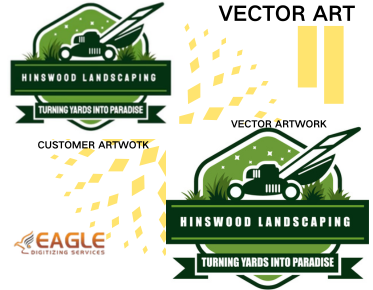Navigating the World of US Professional Embroidery Digitizing Services
In the vibrant realm of embroidery, digitizing stands as a pivotal process that bridges the gap between design conception and fabric realization. Professional embroidery digitizing services transform intricate designs into machine-readable formats, ensuring that every stitch aligns perfectly with the envisioned artwork. This necessity is magnified for businesses and hobbyists aiming for precision, efficiency, and exceptional quality in their embroidered products.
Why Choosing the Right Digitizing Company Matters
The quality of digitizing can make or break an embroidery project. Selecting the right company ensures that the final output is not only visually appealing but also free from issues like thread breaks or fabric puckering. The right digitizing company employs skilled technicians who understand the nuances of stitch types, density, and fabric behavior, ultimately enhancing the durability and aesthetic of the embroidered piece.
Overview of the US Market for Embroidery Digitizing
The US market for embroidery digitizing is robust, catering to a diverse clientele that includes fashion designers, promotional product manufacturers, and individual crafters. With numerous companies vying for attention, the market offers a spectrum of services from basic digitizing to highly customized and complex designs. Staying abreast of the top players in this field can help you make informed decisions and secure the best results for your projects.
Understanding Embroidery Digitizing
What is Embroidery Digitizing?
Embroidery digitizing is the art and science of converting artwork into a digital file that an embroidery machine can interpret. This process involves mapping out stitches in a way that the machine can follow to recreate the design on fabric. It requires specialized software and a deep understanding of embroidery techniques to ensure that the final product is both accurate and aesthetically pleasing.
Key Factors in Quality Digitizing
Quality digitizing hinges on several factors: precision in stitch placement, appropriate stitch types and densities, and careful consideration of the fabric type. A well-digitized design will minimize thread breaks, reduce puckering, and ensure that details are crisp and clear. Expertise in these areas distinguishes top-notch digitizing services from mediocre ones.
Common Uses of Digitized Embroidery
Digitized embroidery finds applications across various domains, including fashion, corporate branding, sportswear, and personalized gifts. From intricate monograms on luxury linens to bold logos on promotional caps, digitized designs add a touch of professionalism and elegance to embroidered items.
Criteria for Choosing the Best Company
Quality of Work: What to Look For
Examine samples of a company's previous work to gauge their quality. Look for sharp, clean lines, consistent stitch density, and smooth gradients. High-quality digitizing should translate into minimal thread issues and a polished final product.
Turnaround Time: Fast vs. Reliable
Turnaround time is critical, especially in firms with tight deadlines. However, speed should not compromise quality. Reliable companies balance efficiency with meticulous attention to detail, ensuring timely delivery without sacrificing the integrity of the design.
Cost Considerations: Budgeting for Digitizing Services
Embroidery digitizing costs can vary widely. Consider whether the pricing is per design or based on a subscription model. While cheaper services might seem attractive, they often lack the quality and customer support offered by more established companies. Allocate your budget wisely to avoid compromising on quality.
Customer Service: Why It’s Crucial
Effective customer service is the backbone of a satisfactory digitizing experience. A company that offers prompt, helpful responses and support throughout the process can make a significant difference, especially when handling complex or custom designs.
Top-Rated Embroidery Digitizing Companies
Overview of the Best Companies in the USA
Several companies have earned top ratings in the US for their exceptional digitizing services. Names like Absolute Digitizing, Eagle Digitizing, and Cre8iveSkill stand out due to their consistent quality, innovative approaches, and customer satisfaction.
How These Companies Stand Out
These leading companies distinguish themselves through their use of cutting-edge technology, highly skilled digitizers, and comprehensive quality control processes. They often offer additional services such as vector art conversion, ensuring a one-stop solution for all embroidery needs.
Customer Reviews and Testimonials
Customer reviews provide valuable insights into a company's reliability and service quality. Look for testimonials that highlight successful projects, excellent customer support, and overall satisfaction to gauge the company's reputation in the industry.
Comparing Services Offered
Range of Services: Basic vs. Advanced Digitizing
Basic digitizing covers straightforward designs with minimal color changes and simple stitch types. Advanced digitizing includes features like 3D effects, applique, and intricate detailing. Choosing the right service level depends on your project's complexity and your desired outcome.
Customization Options: Personalizing Your Designs
Top companies offer extensive customization options, allowing you to tailor designs to your specific needs. This can include adjusting stitch types, and densities, and incorporating unique elements like metallic threads or sequins for added flair.
Special Features: 3D Embroidery, Applique, and More
Special features like 3D embroidery and applique add depth and texture to designs, making them stand out. These techniques require advanced skills and specialized knowledge, which the best companies possess, ensuring your designs are executed flawlessly.
Turnaround Time and Reliability
Average Turnaround Times for Top Companies
Top digitizing companies typically offer turnaround times ranging from 24 to 72 hours for standard orders. For more complex projects, the timeline might extend slightly, but they maintain a balance between speed and quality.
Handling Rush Orders: Who Does it Best?
When deadlines are tight, some companies excel at handling rush orders without compromising quality. Companies like Absolute Digitizing and Eagle Digitizing are known for their efficiency in processing urgent requests while maintaining high standards.
Reliability and Consistency in Service
Consistency in service is crucial for building trust. Leading companies ensure that every order meets their quality benchmarks, providing reliable results time and again. This reliability fosters long-term relationships with clients who depend on consistent excellence.
Pricing Structures
Understanding Pricing Models: Per Design vs. Subscription
Pricing models vary, with some companies charging per design while others offer subscription plans. Per design, pricing is straightforward and suitable for occasional projects. Subscription models provide cost savings for businesses with frequent digitizing needs, offering unlimited designs for a flat monthly fee.
Getting the Best Value for Your Money
Evaluate what you get for your money. Sometimes spending a little more up front offers higher quality and fewer problems down the road. Consider the company's reputation, the range of services included, and any additional support offered.
Hidden Costs to Watch Out For
Be aware of potential hidden costs such as revisions, rush fees, or additional charges for complex designs. Understanding the full pricing structure upfront can help you avoid unexpected expenses and budget more effectively.
Quality Assurance
How Top Companies Ensure High-Quality Digitizing
Top companies employ rigorous quality assurance protocols, including multiple rounds of testing and review. They often use advanced software to simulate the embroidery process, identifying and rectifying potential issues before production.
Common Quality Control Practices
Common practices include test stitching, where designs are stitched out on similar fabrics to check for issues. Detailed inspections ensure that the final product meets the highest standards, with adjustments made as necessary.
What to Do If You're Not Satisfied
If you’re not satisfied with the digitizing service, reputable companies typically offer revisions or refunds. Clear communication about the issues and what needs correction can help resolve problems swiftly and satisfactorily.
Technology and Software Used
Leading Software in the Industry
Leading digitizing companies use top-tier software like Wilcom, Hatch, and Pulse. These programs offer robust features for precise control over stitch types, densities, and design elements, ensuring high-quality outcomes.
How Technology Enhances Digitizing Quality
Advanced software enhances quality by providing tools for detailed design manipulation and accurate stitch simulation. It allows digitizers to preview how designs will stitch out, making necessary adjustments to optimize the final product.
Innovations in Embroidery Digitizing
Innovations such as artificial intelligence and machine learning are making waves in embroidery digitizing. These technologies can automate complex tasks, improve precision, and speed up the digitizing process, setting new standards for quality and efficiency.
Customer Service and Support
Importance of Good Customer Service
Good customer service is essential for a smooth digitizing experience. It ensures that your questions are answered promptly, issues are resolved quickly, and you feel supported throughout the process.
Best Practices for Handling Customer Inquiries
Top companies adopt best practices like providing multiple contact options (phone, email, chat), responding within 24 hours, and offering detailed, helpful responses. They aim to make the customer feel valued and informed.
Case Studies: Outstanding Customer Support Experiences
Real-life examples of outstanding customer support highlight the importance of good service. For instance, a customer-facing a tight deadline might receive expedited service and constant updates, turning a stressful situation into a positive experience.
Ease of Ordering
Online Platforms and User Experience
The ease of using a company’s online platform significantly affects the customer experience. User-friendly interfaces, clear instructions, and seamless navigation make placing orders straightforward, even for beginners.
Steps to Place an Order with Top Companies
Typically, the order process involves uploading your design, selecting the desired services, and providing any specific instructions. Top companies simplify this process with intuitive platforms and clear guidance at each step.
Simplifying the Order Process for Beginners
For beginners, top companies offer resources like how-to guides, FAQs, and customer support to help navigate the order process. Simplified forms and step-by-step instructions ensure a hassle-free experience.
File Formats and Compatibility
Common File Formats Used in Embroidery Digitizing
Common file formats include DST, PES, EXP, and JEF. Each format corresponds to different embroidery machine brands, so it’s important to choose the right one for your equipment.
Ensuring Compatibility with Your Embroidery Machine
Ensure compatibility by confirming your machine’s supported formats. Most digitizing companies provide multiple file options, so you can select the one that matches your machine.
Converting Files: Tips and Tools
If you need to convert files, tools like Wilcom TrueSizer or online converters can help. These tools allow you to switch between formats without losing design integrity, ensuring smooth operation on your machine.
Customization and Special Requests
Handling Unique and Complex Designs
Top companies excel at handling unique and complex designs. They offer personalized consultations to understand your vision and apply advanced techniques to bring intricate designs to life.
Personalization Options for Different Needs
Whether it’s adding monograms, altering color schemes, or incorporating special elements, personalization options are plentiful. These customizations make your designs truly one-of-a-kind.
Working with Designers for Custom Projects
Collaborating with designers allows for bespoke projects tailored to specific requirements. Top digitizing companies often have in-house designers or partnerships with freelancers to offer this service.
Pros and Cons of Outsourcing Digitizing
Benefits of Using a Professional Service
Outsourcing digitizing offers numerous benefits, including access to expert skills, advanced technology, and time savings. It allows you to focus on other aspects of your business while ensuring high-quality results.
Potential Drawbacks and How to Mitigate Them
Potential drawbacks include higher costs and dependence on external providers. Mitigate these by choosing reputable companies, understanding pricing structures, and maintaining clear communication.
When to Consider In-House Digitizing
Consider in-house digitizing if you have the resources and expertise. It offers greater control and flexibility, though it requires significant investment in software, training, and ongoing maintenance.
Choosing the right embroidery digitizing service involves considering quality, turnaround time, cost, and customer service. Each factor plays a crucial role in achieving successful results. Research thoroughly, read reviews, and request samples to find the best company for your needs. Establish clear communication and understand the pricing and service offerings before making a decision.
Take the time to explore different companies and their services. Reach out with any questions or concerns to ensure you select a provider that aligns with your project goals and expectations.



